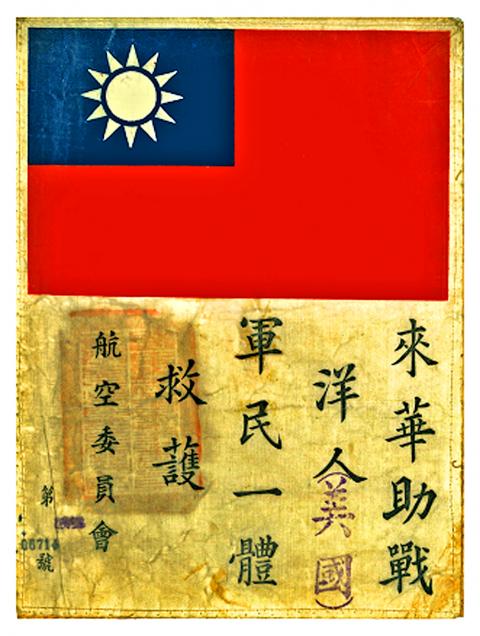An identification or rescue flag, also known as a blood chit, attracted the attention of many visitors on Saturday at the opening of an exhibition for the 70th anniversary of the end of the Second Sino-Japanese War.
Sponsored by Academia Historica, the Ministry of National Defense and the Ministry of Education, the exhibition at the Armed Forces Museum features documents and photographs relating to the 1937-1945 conflict.
One section of the exhibition, which is to run until Nov. 28, is dedicated to the American Volunteer Group (AVG), which operated in China during World War II. Among the items on display is a blood chit bearing an Republic of China (ROC) flag and Chinese inscription.

Photo: CNA, courtesy of Lu Wen-fang
The blood chit says: “This foreign person has come to China to help in the war effort. Soldiers and civilians, one and all, should rescue and protect him.”
The item belonged to Delee Boyd Crum, who joined the AVG and piloted C-47s transport planes over the Himalayas from India to China.
The blood chit, issued by the ROC’s Air Force Commission to AVG pilots serving in the China-Burma-India theater, was taken to the US by Crum after the war.
Crum’s son contacted the museum and said that the chit should be preserved and displayed in the museum so that more people could learn about war history.
The ROC’s Air Force Commission produced 10,000 blood chits for the Flying Tigers, a US outfit under the command of General Claire Chennault and members of the American Volunteer Group.

The inspection equipment and data transmission system for new robotic dogs that Taipei is planning to use for sidewalk patrols were developed by a Taiwanese company, the city’s New Construction Office said today, dismissing concerns that the China-made robots could pose a security risk. The city is bringing in smart robotic dogs to help with sidewalk inspections, Taipei Deputy Mayor Lee Ssu-chuan (李四川) said on Facebook. Equipped with a panoramic surveillance system, the robots would be able to automatically flag problems and easily navigate narrow sidewalks, making inspections faster and more accurate, Lee said. By collecting more accurate data, they would help Taipei

STATS: Taiwan’s average life expectancy of 80.77 years was lower than that of Japan, Singapore and South Korea, but higher than in China, Malaysia and Indonesia Taiwan’s average life expectancy last year increased to 80.77 years, but was still not back to its pre-COVID-19 pandemic peak of 81.32 years in 2020, the Ministry of the Interior said yesterday. The average life expectancy last year increased the 0.54 years from 2023, the ministry said in a statement. For men and women, the average life expectancy last year was 77.42 years and 84.30 years respectively, up 0.48 years and 0.56 years from the previous year. Taiwan’s average life expectancy peaked at 81.32 years in 2020, as the nation was relatively unaffected by the pandemic that year. The metric

TAKING STOCK: The USMC is rebuilding a once-abandoned airfield in Palau to support large-scale ground operations as China’s missile range grows, Naval News reported The US Marine Corps (USMC) is considering new sites for stockpiling equipment in the West Pacific to harden military supply chains and enhance mobility across the Indo-Pacific region, US-based Naval News reported on Saturday. The proposed sites in Palau — one of Taiwan’s diplomatic allies — and Australia would enable a “rapid standup of stored equipment within a year” of the program’s approval, the report said, citing documents published by the USMC last month. In Palau, the service is rebuilding a formerly abandoned World War II-era airfield and establishing ancillary structures to support large-scale ground operations “as China’s missile range and magazine

Passengers on Taiwan High Speed Rail (THSR) will be required to use headphones and make phone calls in gangways under new “quiet travel” rules starting Sept. 22. THSR Chairman Shih Che (史哲) told media that THSR will run a three-month promotional campaign to ensure widespread adoption of the new rules. Those repeatedly ignoring the guidance face the potential termination of their transport contract, which can result in them getting escorted off the train, according to THSR. Shih shared his hope to cultivate an environment conducive to rest and reading for the train’s passengers, stating that these changes aim to “promote self-discipline” among passengers